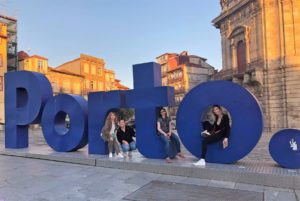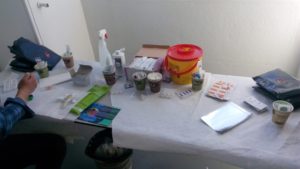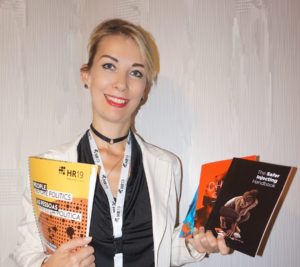In May 2019, Portugal hosted Harm Reduction International Conference (HR19). Elena Shastina, regional coordinator of the project of the Association “E.V.A.” “Prevention of HIV infection with a focus on drug users” who received scholarship from Martine de Schutter Scholarship Fund, had a chance to attend the event. It will not be an exaggeration to say that she will long remember this Conference, which inspired her to continue her efforts to save people’s lives.
- Thoughts are material
About three years ago, a colleague of mine from the EVA Association told me about International Harm Reduction (HR) Conferences. I looked through some photos from such events, admiring the big range of sterile tools, their accessibility and humane attitude to people who are free in choosing their lifestyle and use of substances.
I remembered the time, when 15 years ago in my city there were HIV prevention programs for people who use drugs, with a syringe exchange site operating and outreach workers attending people at home. Those programs were probably the only space free from stigma and discrimination against drug users, a territory where such people were accepted and not judged. It was a place where people could not worry, acting cautiously and expecting aggression from the big world. They could just relax and look around, think about themselves and their needs, about maintaining their health and social links.
Back then I thought, “If I could only try and revive such services for people who use drugs!” It turned out that thoughts are material.
A year and a half after, an HIV prevention project focused on people who use drugs (PWUD) was launched in my city. We had many concerns. Will the government support us? Will we be able to re-establish wide access to services among the target group after so many years when no services were available? We managed to cope with this task! Later, I finally had a chance to attend a Harm Reduction Conference.
From heart to heart
It was a nice surprise to see that the atmosphere at such a serious international conference was quite cosy, with a safe injection room in the central area, not on the sidelines “to get it out of sight.” What really made me happy was the speech by the former country leader Jorge Fernando Branco de Sampaio (1996–2016), initiator of the humane drug policy in Portugal. He said, “Punishment does not work, decriminalization works. Complete integration of the HR approach led to a sharp decline in HIV prevalence and lower prices for medications. Communities see the outcomes of decriminalization and society supports it. Health in prisons and in society is the same thing and we need to take care of it in the same way.”
It felt very good to see Russian-speaking colleagues on stage when awards for the achievements in drug policy were presented. It was “from heart to heart” as my colleagues from Moscow said and now I know for sure that this is the only way you can get things going.
I am not your research tool
Over a thousand participants from all over the globe, unique research studies… and the language barrier. It turned out that my knowledge of English was clearly not enough for such a conference, and there were many of us in a similar situation. 
Takhmina Khaidarova, head of the Tajik Network of Women Living with HIV: “I came to Porto to learn about narcofeminism. In my country, services for people who use drugs are mainly focused on men, so I wanted to learn about the experience of my foreign colleagues and find out how to make those services gender-sensitive. Unfortunately, the language barrier did not allow me to be fully engaged in the Conference activities. However, this event was still very important for me. In Porto, I met a partner organization – AFEW International – and soon we plan to conduct a research on the sexual and reproductive health of women living with HIV in our country.”
Natalia Sidorenko, Advocacy Manager of the Eurasian Network of People Who Use Drugs (ENPUD): “I came to present a poster “Women who use drugs and recommendations of the Committee on the Elimination of Discrimination against Women.” HR19 is one of the few opportunities for activists from among PWUD community to learn about the international experience. I think that such conferences give us a new perspective as in our region I see a certain stagnation of harm reduction activities. At such events, you see that HR is not only about syringe distribution, it is also about safe injection rooms and services for those who use both injecting and non-injecting substances. Besides, I really liked the session about chemsex among women. Unfortunately, the language barrier limited my access to the sessions I was interested in. At some sessions, English-speaking colleagues and EHRA representatives helped with translation, but I still wish there was conference interpreting.”
It was important for me to attend the session called “Research 101” by our Canadian colleague Scott Neufeld. Productive work, innovations, sustainable funding – all those things are possible if we use evidence-based approaches. “I am not your research tool! I live my life. If you want me, you have to accept my conditions,” he said addressing academia. However, his key message was the need to build the capacity of community and learn how to develop research tools and use the data received. The data collected by the community is the most fair, which means that it most accurately reflects the community needs and the advocacy targets.
I was also impressed by the presentation of our colleague from Kazakhstan. It was really worth going to Europe to learn about the achievements of our neighbours.
Oxana Ibragimova, head of the Kazakhstan Union of People Living with HIV: “It is the first time when the experience of Kazakhstan activists and patients of opioid substitution therapy (OST) was presented at such a big international conference. After ten years of OST implementation, there were attempts to close substitution treatment programs, but our activists managed to defend them. However, the challenge that we still face is that OST services are accessible to a limited amount of people. The estimated number of people who use drugs in Kazakhstan is 94,600, with only 250 people having access to OST, among them 80% (199) are men and 20% (51) are women. Thus, OST coverage is 0.3% of the estimated number of people who use opioids. As for my general impressions of the Conference, I was greatly inspired by the safe injection room. There were also many interesting handouts in the showroom. Besides, I was impressed by the session delivered by Svetlana Moroz about women who use drugs during armed conflicts.  It was important for me to see the participants from post-Soviet countries. They had a chance to speak at the international arena, talk about the problems of our region and share their achievements.”
It was important for me to see the participants from post-Soviet countries. They had a chance to speak at the international arena, talk about the problems of our region and share their achievements.”
As for me, I came to HR19 with a poster called “The ghost of drug users’ registration ruining people’s lives in Russia” to tell what structural barriers people face in accessing drug treatment and how, if they seek such treatment, they lose access to the most common professions, parenthood, citizenship and so on, i.e. socialization and normal life.
Incredible city
This is how Porto was presented to me: a city with the unbelievable steepness of cobblestone streets running upwards, colourful walls of the houses built in a bizarre style, bright sunlight flooding every millimetre of its space, waves of the Atlantic Ocean and cries of the giant seagulls.
However, there are also other things one can say about Porto. This is a city where you feel safe and free, where people respect your choice and care about you, “city where you run out of lighters.”
Besides, in Porto there is a place hard to imagine for a person from Russia. I learned about this place at the Conference. That is a safe injection room for women opened to implement gender-sensitive approach to harm reduction.
Porto also became the last home to one of our colleagues. The soul of Alena Asayeva, who spent her whole life fighting for humane drug policy, will rest here forever. When Alena left us, it threw me off track for a long time. For almost three months, even in my thoughts I could not go back to what happened at the Conference. At the same time, it made me stronger and more confident that I do the right things. After HR19, for the first time I openly took part in Support, Don’t Punish campaign.
Visibility, new alliances, key messages, political will, cascade of services, evidence-based approaches, accurate data – all those things will put an end to our survival and fear, will allow us to be present here and now, enjoy our life and make plans for the future.




